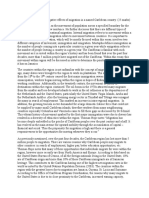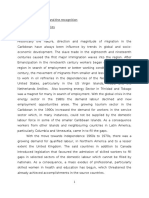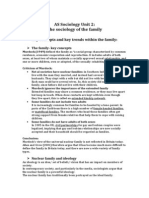Globalization in The Caribbean
Globalization in The Caribbean
Uploaded by
Jessica DoeCopyright:
Available Formats
Globalization in The Caribbean
Globalization in The Caribbean
Uploaded by
Jessica DoeOriginal Description:
Original Title
Copyright
Available Formats
Share this document
Did you find this document useful?
Is this content inappropriate?
Copyright:
Available Formats
Globalization in The Caribbean
Globalization in The Caribbean
Uploaded by
Jessica DoeCopyright:
Available Formats
FOR - Neither globalization, nor the multinational corporations do anything to improve the economic growth and development prospects
of the Caribbean region. Before I begin, I would first like to define the key terms of this debate namely, globalization and Multinational Corporations. The Oxford University Press (2013) clearly defines globalization as the process by which businesses or other organizations develop international influence or start operating on an international scale. On the other hand, Multinational Corporation (MNC) is plainly defined by WebFinance (2013) as an enterprise operating in several countries but managed from one (home) country. Globalization is not new to the world and certainly not to the Caribbean Region. Recorded history reveals that for over a century there has been the international trading of commodities by the Region. Interestingly we discover that this trade began with Grenada, who exported nearly 100,000 pounds of spice in 1881 (Groome, n.d). However, the concept of Multinational Corporations is fairly new to the region and was only recently introduced in the twentieth century. We need to look at globalization and Multinational Corporation from the standpoint of both economic growth and development with the goal of ascertaining whether they have achieved this. The crux of our case is that globalization and multinational corporations do little to improve the economic growth and development prospects of the Caribbean Region. Where globalization means, as it so often does, that the rich and powerful now have new means to further enrich and empower themselves at the cost of the poorer and weaker, we have a responsibility to protest in the name of universal freedom, a quote from Nelson Mandela. The Caribbean region has long been labeled and seen by the international community as comprising of predominantly developing countries with the exception of Barbados, Jamaica, the Bahamas, and Trinidad and Tobago. The region has had a comparative advantage in cheap labor and natural resource endowments, which allowed it to compete globally; however this has been lost due to the ever-increasing innovations by developed countries which have allowed them and their products to be even more competitive through a more knowledge- based economy (Morris, n.d). This leads to the point that globalization has only created an avenue for larger, and more developed countries to exploit the smaller countries in the region. An example would be the preferential trade agreement for the former colonies of the European Union that favored banana growers; however, this agreement restricted Dole, Chiquita and Del Monte three major banana producing U.S companies which controlled two thirds of the world banana market (Harper, n.d). These three companies controlled 42% of the European market compared to 8% by the Caribbean (Harper, n.d). Chiquita and Dole also contributed to the US political parties. In 1996 the US government protested to the World Trade Organization (WTO) on behalf of these companies. It should be noted that the US does not export banana. The removal of the preferential trade agreement caused the banana market in the Caribbean to decline steadily, as
they are limited by physical size and the increasing cost of production. In countries like Dominica and St. Lucia which depended on banana exports, the removal of the preferential trade agreement was detrimental to the economy. This was considered an example of quid pro quo [this for that] motivated trade policies in other words the developed country operating with its own interests in mind at the expense of developing countries (Harper, n.d). Caribbean countries that are considered poor such as Haiti and Dominica are usually forced to accept globalization, in most cases allowing foreign investors from more developed countries to take advantage of lower wage rates and their natural resources. The introduction of foreign investment appears to be good for our Caribbean countries; however, profits from these investors are returned to their home country and do not contribute to our economic growth or development. It should also be noted that the primary exports of the developing countries in the Caribbean are typically agricultural products. When mature industries move to the Caribbean and become mechanized, or introduce automation, they inevitably result in job losses. Globalization also creates inequality in trade. Developed countries have farmers who receive subsidiaries from them; as such developing countries cannot compete. In the Caribbean not only are most governments unable to afford subsidizing farmers, the islands are also limited by size and farmable land. Globalization links all the worlds economies together through trade. One may look at this as a good thing. However, upon closer inspection, one will discover this is not true in all aspects. The link that globalization creates can be unfavorable to all countries, including the Caribbean Region. The recent 2008-09 financial crisis in the United States has been one of the most recent examples of how financial failure of one country can spread throughout the globe. The U.S financial crisis had a domino effect, affecting countries like Japan and even the Caribbean Region. The financial crisis in the Caribbean resulted in the number of tourist arrivals declining within nine months which caused countries GDP to decline. There was also rising unemployment and a reduction in government revenue (Caribbean Actuarial Association, 2009). This effect cannot be avoided as countries are in essence tied together, and as such it can be seen as a negative effect of globalization on economic growth. Taking a look at the presence of Multinational Corporations that exist as a result of globalization, it can be said that they do little to improve the economic prospects of the host countries, in this case the countries of the Caribbean Region. Multinational Corporations negatively affect small businesses in the region primarily due to the fact that they tend to dominate the market. Small businesses are essential to the Region, particularly in that they stimulate economic growth by providing employment, and develop and introduce innovative products. Small businesses, usually ran by local entrepreneurs, are unable to compete with these big corporations that are able to give high volume deals and discounts (Stanley, 2013). Ultimately, future growth for these small businesses is stifled by these big corporations and they are rendered unable to contribute to the countries development.
It is claimed that MNCs create employment in host countries, but have we looked at the bigger picture? Are these employment opportunities really as grand as we perceive them? The truth is the multinational corporations are only interested in cheap labor and creating profit from this labor. Dominica for example is a country that has provided this cheap labor to an MNC Clear Habour. At the moment people are employed there; however, Clear Habour has no strong ties to Dominica and may leave at anytime creating a great unemployment problem or they may chose to eliminate jobs (as they have done before) to increase their profits. This depicts how a MNC is only exploiting its host countrys resources in order to make a financial profit. . Caribbean countries could face poverty, economical stagnancy or decline, income inequality, food insecurity and lack of welfare as a result of the negative effects of globalization and Multinational Corporations. Globalization and Multinational Corporations only benefit the well developed countries while its disadvantages fall heavily on the shoulders of less developed parts of the world like the Caribbean Region.
References: Caribbean Actuarial Association. (2009, December 4). Impact of the financial crisis in the Caribbean- tourism and bauxite. Retrieved from http://www.caa.com.bb/2009_Presentations/Impact_of_the_Financial_Crisis_in_the_Cari bbean_Dennis_Morrison.pdf Groome, J. R. (n.d). The nutmeg story. Retrieved from http://www.grenadahistory.org/nutmeg.htm Harper, A. (n.d). Developed nations exploit Caribbean economies. Retrieved from http://daacademy.org/exploit.html Morris, J. A. (n.d). Challenges for the Caribbean. Retrieved from http://www.wgig.org/docs/book/Jacqueline_A_Morris.html Stanley, D. (2013). Negative impacts of multinational corporations. Retrieved from http://www.ehow.com/info_8110394_negative-impacts-multinational-corporations.html Oxford University Press. (2013). Globalization. Retrieved from http://oxforddictionaries.com/definition/english/globalization
WebFinance. (2013). Multinational corporation (MNC). Retrieved from http://www.businessdictionary.com/definition/multinational-corporationMNC.html#ixzz2XpuOXlY7
Profit sent back to home country
Globalization can lead to financial problems.
The development of orchards and plantations by multinational companies in the poorer countries of the world often means reduced land available for production of local food supplies.
Multinational corporations are accused of social injustice, unfair working conditions (including slave labor wages and poor living and working conditions), as well as a lack of concern for the environment, mismanagement of natural resources, and ecological damage. 3. Multinational corporations which were previously restricted to commercial activities are increasingly influencing political decisions. Many think there is a threat of corporations ruling the world because they are gaining power due to globalization.
http://www.manufacturing.net/articles/2010/06/the-pros-and-cons-of-globalization
http://www.caa.com.bb/2009_Presentations/Impact_of_the_Financial_Crisis_in_the_Caribbean_Den nis_Morrison.pdf (Caribbean Actuarial Association, 2009) Read more at http://www.brainyquote.com/quotes/quotes/n/nelsonmand447260.html#LG7e5As6gch5wct8.99
http://www.wgig.org/docs/book/Jacqueline_A_Morris.html- morris http://www.eclac.org/publicaciones/xml/0/10030/Globalization-Chap11.pdf http://oxforddictionaries.com/definition/english/globalization http://www.caricom.org/jsp/community/donor_conference_agriculture/preferences.pdf Read more: http://www.businessdictionary.com/definition/multinational-corporation-MNC.html#ixzz2XpuOXlY7
http://www.grenada-history.org/nutmeg.htm - caribbean conserva
http://da-academy.org/exploit.html http://jamaica-gleaner.com/latest/article.php?id=44352 Disadvantages of Globalization: Developed countries can stifle development of undeveloped and under-developed countries. o Economic depression in one country can trigger adverse reaction across the globe. o It can increase spread of communicable diseases. o Companies face much greater competition. This can put smaller companies, at a disadvantage as they do not have resources to compete at global scale. Definitions Theme the crux of our case is that globalization and multinational corporations do little to improve the economic growth and development prospects of the Caribbean region Label explainexamplestie back http://post.queensu.ca/~biol439/B522/Debate/Pages%20from%20DEBATINGa.pdf
o
2. 3. 4. 5.
http://www.ehow.com/info_8110394_negative-impacts-multinational-corporations.html stanley http://www.staff.ncl.ac.uk/david.harvey/MKT3008/Multinationals.html http://www.mightystudents.com/essay/Negative.effects.Globalization.14907 --- gdp
It is true that GDP in the Caribbean Region has been growing, and showed a 0.9% rise in 2012 (The Gleaner, 2013). However, this
You might also like
- Caribbean Studies Movements Towards IndepDocument3 pagesCaribbean Studies Movements Towards IndepBeanonceflickedNo ratings yet
- Plantation Society - BeckfordDocument13 pagesPlantation Society - BeckfordGabz Gabby100% (1)
- Coffee Franchise in VNDocument9 pagesCoffee Franchise in VNNhím BiểnNo ratings yet
- KFCDocument30 pagesKFCjaydeep231267% (3)
- Adv & Disadv of GlobalizationDocument3 pagesAdv & Disadv of Globalizationramdman100% (5)
- Regional Integration (Caricom)Document8 pagesRegional Integration (Caricom)Mat Bernz100% (1)
- Impact of Globalization On Caribbean EconomiesDocument4 pagesImpact of Globalization On Caribbean EconomiesJason Richards92% (12)
- The Effects of Globalization On The CaribbeanDocument8 pagesThe Effects of Globalization On The CaribbeanJensen100% (3)
- Discuss The Positive and Negative Effects of Migration in A Named Caribbean CountryDocument3 pagesDiscuss The Positive and Negative Effects of Migration in A Named Caribbean CountryRosemaryReynolds50% (2)
- Communication Studies Module 2Document2 pagesCommunication Studies Module 2Rojhni musiq100% (1)
- Communication Studies IA General IntroductionDocument1 pageCommunication Studies IA General IntroductionSherrefer Levy0% (1)
- Caribbean Studies: MODULE 1Document2 pagesCaribbean Studies: MODULE 1Danny Anngenie Sookoo100% (1)
- Sociology Past PaperDocument2 pagesSociology Past PaperAbdul Quadri33% (3)
- Internal Assesment For Caribbean StudiesDocument20 pagesInternal Assesment For Caribbean StudiesBrandonNo ratings yet
- CAPE Sociology Unit 1 .2Document2 pagesCAPE Sociology Unit 1 .2Drip BossNo ratings yet
- Literature Sba EditedDocument11 pagesLiterature Sba Editedrahjean100% (1)
- Caribbean Studies IaDocument16 pagesCaribbean Studies IaShaun Cuteboy TaylorNo ratings yet
- CAPE Sociology 2017 U2 P2Document13 pagesCAPE Sociology 2017 U2 P2Christina FrancisNo ratings yet
- Caribbean Studies - The Nature and Purpose of Research 2014Document3 pagesCaribbean Studies - The Nature and Purpose of Research 2014Daneilla BanksNo ratings yet
- Is There A Reserve Army of LabourDocument13 pagesIs There A Reserve Army of Labourapi-25906170100% (1)
- Caribbean Studies Internal AssessmentDocument29 pagesCaribbean Studies Internal AssessmentJoelNo ratings yet
- CAPE CARIBBEAN STUDIES IntegrationDocument33 pagesCAPE CARIBBEAN STUDIES IntegrationSeondre DayeNo ratings yet
- Extra-Regional Migration and Its Impact On The CaribbeanDocument6 pagesExtra-Regional Migration and Its Impact On The CaribbeanTashana Irving50% (2)
- Caribbean IaDocument25 pagesCaribbean IaBinta BaptisteNo ratings yet
- CAPE CARIBBEAN STUDIES IntegrationDocument36 pagesCAPE CARIBBEAN STUDIES IntegrationSeondre Daye100% (1)
- CAPE Sociology Unit 1 Course Outline 2022-2023Document4 pagesCAPE Sociology Unit 1 Course Outline 2022-2023ChryseanjNo ratings yet
- Family Types in The CaribbeanDocument16 pagesFamily Types in The Caribbeankayanna100% (1)
- Sociology IA CompleteDocument29 pagesSociology IA CompleteChaze DacostaNo ratings yet
- For A Named Caribbean CountryDocument3 pagesFor A Named Caribbean CountrySaunakay LongshawNo ratings yet
- CH 03Document34 pagesCH 03hola_peque1402No ratings yet
- CAPE Unit 1 Management of Business June 2009 P2Document6 pagesCAPE Unit 1 Management of Business June 2009 P2Sachin BahadoorsinghNo ratings yet
- Com Studies Sba - CpyDocument14 pagesCom Studies Sba - Cpymdavern12No ratings yet
- Sociology Practice Essay QuestionsDocument2 pagesSociology Practice Essay QuestionsSaheliahNo ratings yet
- Sociology Outline - Syllabus RequirmentsDocument12 pagesSociology Outline - Syllabus Requirmentsmashronee blissettNo ratings yet
- CAPE Management of Business 2017 U2 P2Document13 pagesCAPE Management of Business 2017 U2 P2Jodel Stoute0% (1)
- Communication Studies Essay NotesDocument12 pagesCommunication Studies Essay NotesAnisha BassieNo ratings yet
- Caribbean Studies IADocument18 pagesCaribbean Studies IAansa_france100% (1)
- CAPE Economics Unit 1 2004 Paper 2Document5 pagesCAPE Economics Unit 1 2004 Paper 2sashawoody167100% (1)
- Caribbean Studies Finished ProductDocument52 pagesCaribbean Studies Finished Producttrudy-annNo ratings yet
- CAPE June2011 Sociology Unit2 Ques2.ExDocument9 pagesCAPE June2011 Sociology Unit2 Ques2.ExJordy13No ratings yet
- Caribbean Studies IADocument33 pagesCaribbean Studies IAK100% (1)
- Carib Studies Module 2 NotesDocument96 pagesCarib Studies Module 2 NotesMika Vaughn100% (1)
- Module 1 Notes SummaryDocument22 pagesModule 1 Notes SummaryDaniellePeddieNo ratings yet
- Population Control Is The Key To The Development of Caribbean Societies.Document3 pagesPopulation Control Is The Key To The Development of Caribbean Societies.Nicholas Wezley Bahadoorsingh100% (4)
- Sociology Essay Plantation SystemDocument38 pagesSociology Essay Plantation SystemTiseannaNo ratings yet
- Economic EnfranchisementDocument1 pageEconomic EnfranchisementArif Mohamed100% (2)
- CAPE Sociology 2016 U2 P2Document16 pagesCAPE Sociology 2016 U2 P2roxanne taylor40% (5)
- Caribbean+Studies 2005 p1 AnswersDocument7 pagesCaribbean+Studies 2005 p1 AnswersAaron WalkerNo ratings yet
- Complete Draft of I.A.Document22 pagesComplete Draft of I.A.Janeel Cowan100% (3)
- Cape Caribbean Exam Paper 2 What To ExpectDocument6 pagesCape Caribbean Exam Paper 2 What To ExpectKrama JonesNo ratings yet
- Caribbean Studies Plantation SocietyDocument4 pagesCaribbean Studies Plantation Societysmartkid167100% (1)
- Caribbean Studies EssaysDocument4 pagesCaribbean Studies EssaysRyan RamkirathNo ratings yet
- Caribbean Studies IADocument40 pagesCaribbean Studies IAMarcusAbraham0% (1)
- As Sociology Unit 2Document15 pagesAs Sociology Unit 2Sanda GrigorasNo ratings yet
- CXC CAPE Caribbean Studies IADocument17 pagesCXC CAPE Caribbean Studies IAToni AndersonNo ratings yet
- CAPE Entrepreneurship Past Papers U1 2015 - 2016 PDFDocument28 pagesCAPE Entrepreneurship Past Papers U1 2015 - 2016 PDFEsther ReubenNo ratings yet
- Education and Development: Policy Imperatives for Jamaica and the CaribbeanFrom EverandEducation and Development: Policy Imperatives for Jamaica and the CaribbeanNo ratings yet
- Jprince PaperDocument16 pagesJprince PaperLecturers InnNo ratings yet
- 4 Global Contexts: Aims of This ChapterDocument21 pages4 Global Contexts: Aims of This ChapterstephjmccNo ratings yet
- Globalization Has Promoted More Ills Than Benefits For Caribbean SocietiesDocument3 pagesGlobalization Has Promoted More Ills Than Benefits For Caribbean SocietiesAntoine BurkeNo ratings yet
- Grade 1 1 Notes.Document7 pagesGrade 1 1 Notes.6vc96tk5q6No ratings yet
- Manufacturing Accounts PowerpointDocument12 pagesManufacturing Accounts PowerpointRaynardo KnightNo ratings yet
- Desain Tanpa JudulDocument25 pagesDesain Tanpa Judulsudy dmbNo ratings yet
- CFO Director Finance Controller in Chicago IL Resume Louis ColellaDocument3 pagesCFO Director Finance Controller in Chicago IL Resume Louis ColellaLouisColellaNo ratings yet
- Ethical and Unethical Practices in MarketingDocument7 pagesEthical and Unethical Practices in MarketingSeema BaranwalNo ratings yet
- Accounting Problems - 2018Document31 pagesAccounting Problems - 2018Albert Moreno100% (4)
- The FAST AgreementDocument14 pagesThe FAST AgreementRyan VetterNo ratings yet
- HR Policy: Is Infosys Losing Employee-Friendly Status?Document3 pagesHR Policy: Is Infosys Losing Employee-Friendly Status?Nitin SevakNo ratings yet
- Bangladesh Submarine Cable Company Limited: ANNUAL REPORT 2012-2013Document1 pageBangladesh Submarine Cable Company Limited: ANNUAL REPORT 2012-2013Tasnif MahmudNo ratings yet
- PALS Bar Ops Pilipinas Must Read Cases TAXATION 2015Document52 pagesPALS Bar Ops Pilipinas Must Read Cases TAXATION 2015manol_salaNo ratings yet
- AQA ACCN3 W QP Jan11Document8 pagesAQA ACCN3 W QP Jan11Afzal UsmanNo ratings yet
- BADI in InfospokeDocument12 pagesBADI in InfospokeAadil MohammedNo ratings yet
- LCC - Renewal of Contractor's LicenseDocument23 pagesLCC - Renewal of Contractor's LicenseJason LucasNo ratings yet
- Road To RichesDocument19 pagesRoad To Richesgungi1950No ratings yet
- Tiếng Anh kinh doanh mã đề 201Document2 pagesTiếng Anh kinh doanh mã đề 201Hoàng Như QuỳnhNo ratings yet
- 6 National Creativity Aptitude Test: PresentDocument4 pages6 National Creativity Aptitude Test: Presentgohel komalNo ratings yet
- What WHY AND: Business Problems Solved Through Desi Network-Bouncing BoardsDocument4 pagesWhat WHY AND: Business Problems Solved Through Desi Network-Bouncing BoardsMotivational ExpeditiousNo ratings yet
- Additional Private Admissions List 2014 2015Document25 pagesAdditional Private Admissions List 2014 2015Mayra GarrettNo ratings yet
- AcknowledgementDocument48 pagesAcknowledgementchi005No ratings yet
- The Indian Hotels Company Limited: SWOT Analysis & Company ProfileDocument4 pagesThe Indian Hotels Company Limited: SWOT Analysis & Company ProfileaditiNo ratings yet
- Principles of Management (Question and Answers)Document13 pagesPrinciples of Management (Question and Answers)Erick A. T. INo ratings yet
- AnswersDocument9 pagesAnswersSajidZiaNo ratings yet
- Pidilite Industries, WD-40 Company Enter Tie-Up For Multi-Purpose Spray in India (Company Update)Document3 pagesPidilite Industries, WD-40 Company Enter Tie-Up For Multi-Purpose Spray in India (Company Update)Shyam SunderNo ratings yet
- Implications of Strategic Human Resource ManagementDocument3 pagesImplications of Strategic Human Resource Managementtallalbasahel67% (3)
- Analisis Pengaruh Citra Merek Terhadap Keputusan Pembelian: Starbucks Coffee Dutamall BanjarmasinDocument8 pagesAnalisis Pengaruh Citra Merek Terhadap Keputusan Pembelian: Starbucks Coffee Dutamall BanjarmasinTasya AdnaNo ratings yet
- Business Organization AllDocument61 pagesBusiness Organization AllsandipahotaNo ratings yet
- Man MachDocument5 pagesMan MachLovely RainNo ratings yet
- Principles of Option PricingDocument23 pagesPrinciples of Option Pricingcharansap100% (1)
- How and Why Wonder Book of Coins and CurrencyDocument52 pagesHow and Why Wonder Book of Coins and Currencykett8233100% (7)

























































































